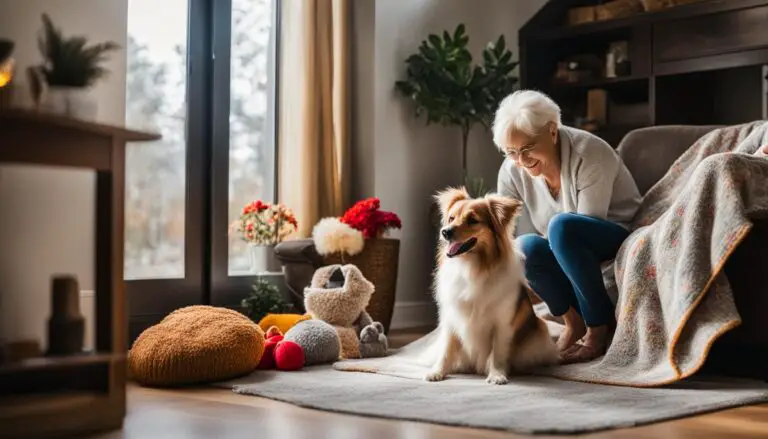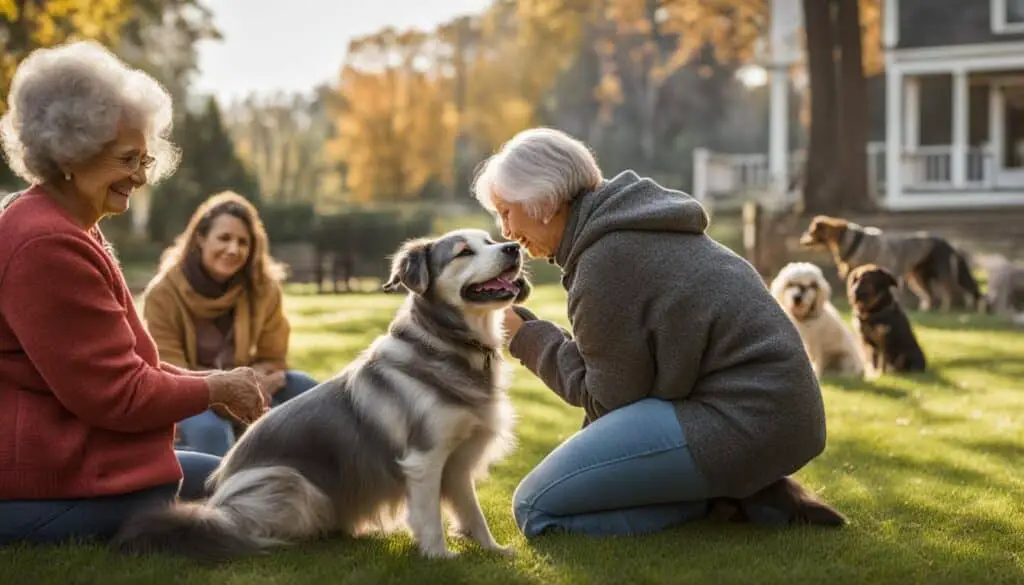When it comes to adopting a furry companion, many people automatically think of puppies. However, there is a group of dogs that often get overlooked – senior dogs. These wise and lovable creatures have so much to offer, yet they often find themselves waiting in shelters, hoping for a second chance at a forever home.
Adopting a senior dog not only brings immense joy and love into your life, but it also saves a precious life. These older canines have so much love to give, and by welcoming them into your home, you provide them with the care and attention they truly deserve.
One of the greatest advantages of adopting a senior dog is the wealth of information available about their background, energy level, and compatibility with other animals. Unlike with younger dogs, you have a clearer understanding of their needs and behaviors from the start.
Key Takeaways:
- Adopting a senior dog means saving a precious life and welcoming a lifetime of love.
- Senior dogs often require less training and are frequently already housetrained.
- They have lower energy levels, making them a better fit for certain lifestyles.
- While challenges may arise, such as potential separation anxiety and health issues, the rewards of adopting a senior dog are immeasurable.
- By adopting a senior dog, you offer them a second chance at finding a loving home and experience the fulfillment of providing a safe and caring environment.
The Benefits of Adopting a Senior Dog
When it comes to adopting a pet, many people tend to gravitate towards puppies or younger dogs. However, adopting a senior dog can be incredibly rewarding in many ways. Senior dogs, despite being often overlooked, have a lot to offer and can make excellent companions. Let’s explore the benefits of adopting a senior dog and why they deserve a chance at a loving home.
One of the advantages of adopting a senior dog is that you have the opportunity to learn more about their personality, grooming requirements, and compatibility with other animals. Unlike puppies, whose personalities are still developing, senior dogs’ behaviors are more predictable, allowing you to find the perfect match for your family. Knowing their size and activity level upfront can help ensure a better fit for your lifestyle.
Another significant benefit is that senior dogs typically require less training. They are often already housetrained and have a better understanding of basic commands. This means less time spent on training and more time enjoying the companionship of your new furry friend. Additionally, senior dogs have lower energy levels and exercise needs compared to younger dogs, making them a perfect choice for those with a more relaxed lifestyle.
| Benefits of Adopting a Senior Dog |
|---|
| Opportunity to learn about their personality and grooming requirements |
| Less training required as they are often already housetrained |
| Lower energy levels and exercise needs compared to younger dogs |
| Easier to choose a dog that fits your lifestyle |
| More predictable behaviors as their personalities are well-developed |
While senior dogs may come with some challenges such as potential separation anxiety, longer adjustment periods, and health issues, the rewards of adopting them are immeasurable. Providing a senior dog with a loving home in their twilight years allows them to experience comfort, care, and companionship. It also offers a fulfilling and heartwarming experience for the adopter, knowing that they have made a positive difference in a senior dog’s life. So, consider giving a senior dog a second chance at happiness and uncover the joy they can bring to your life.
Challenges of Adopting an Older Dog
When considering adopting an older dog, it’s important to be prepared for the unique challenges that may arise. One challenge is the potential for separation anxiety in older dogs. If their previous owner stayed home all day, they may have a longer adjustment period when entering a new home. Providing them with a calming environment and gradually increasing the time spent apart can help alleviate this anxiety.
Health problems are another challenge to be aware of when adopting a senior dog. Conditions such as arthritis, kidney disease, cancer, and chronic arthritis can occur in older dogs. Regular veterinary care, including check-ups and proper management of these health issues, is crucial to ensure their well-being.
Social dynamics can also be a challenge, as some senior dogs may exhibit wariness around lively children and other pets. It’s important to observe their body language closely and provide a safe and controlled environment for interactions. Slow introductions, positive reinforcement, and supervision can help foster positive relationships.
Mobility challenges may arise as well, especially in dogs with age-related conditions. Accommodations may need to be made to assist senior dogs in their daily routine, such as providing ramps or stairs for easier access to vehicles or elevated areas. Ensuring their physical comfort and safety is essential.
FAQ
What are the benefits of adopting a senior dog?
By adopting a senior dog, you are giving them a second chance at a loving home while also saving a precious life. Additionally, knowledge about the dog’s background, energy level, and compatibility with other animals is readily available when adopting a senior pet. Senior dogs also tend to require less training and are often already housetrained. They have lower energy levels and exercise needs, making them a better fit for certain lifestyles.
What are the challenges of adopting an older dog?
Some challenges of adopting an older dog include potential separation anxiety, longer adjustment periods, health problems, wariness around children and other pets, and mobility challenges. It’s important to be prepared for these potential challenges and provide the necessary care and accommodations to ensure their comfort and well-being.
What health problems should I watch for in senior dogs?
Some health problems to watch for in senior dogs include arthritis, urinary or fecal incontinence, and hearing and vision loss. They may require extra care and management for these health issues, including regular veterinary check-ups and appropriate medication or therapy.
How can I help a senior dog with mobility challenges?
While some senior dogs may have mobility challenges, accommodations can be made to help them navigate their environment. This may involve providing ramps or stairs for easier access to vehicles or higher places, and ensuring a safe and comfortable living space that minimizes the risk of falls or injuries.
What should I expect when adopting a senior dog?
When adopting a senior dog, you have the opportunity to learn more about their personality, grooming requirements, and compatibility with other animals. Senior dogs’ behavior is more predictable as their personalities are already well-developed. While they may require a longer adjustment period in a new home, they can provide a lifetime of love and companionship.


